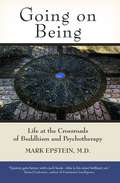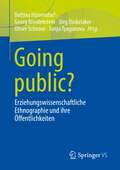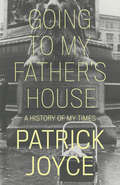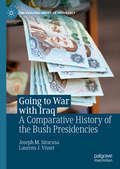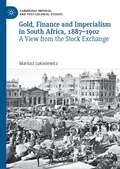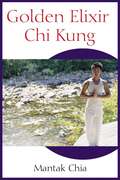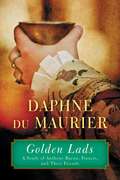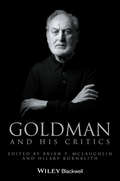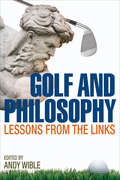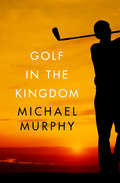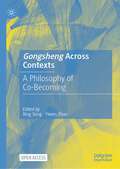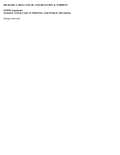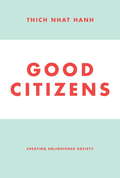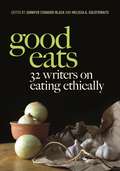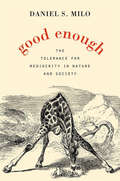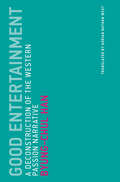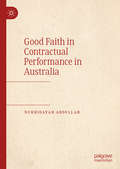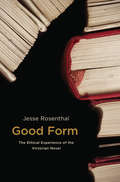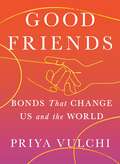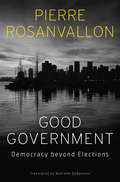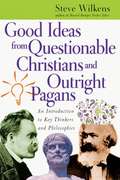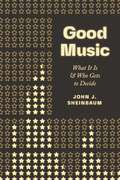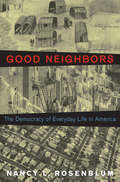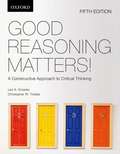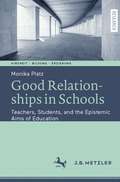- Table View
- List View
Going on Being
by Mark EpsteinBefore he began training as a psychiatrist, Mark Epstein immersed himself in Buddhism through influential teachers such as Ram Dass, Joseph Goldstein, and Jack Kornfield. Buddhism's positive outlook and the meditative principle of living in the moment profoundly influenced his study and practice of psychotherapy. Going on Being is an intimate chronicle of Epstein's formative years as well as a practical guide to how a Buddhist understanding of psychological problems can help anyone change for the better. Epstein gives readers a deeply personal look into his life, thoughts, fears, and hopes, while detailing the influences that have shaped his worldview. Inspiring in its honesty and humility, Going on Being is a compassionate, brilliant look at how uniting the worlds of psyche and spirit can lead to a new way of seeing reality.
Going public?: Erziehungswissenschaftliche Ethnographie und ihre Öffentlichkeiten
by Georg Breidenstein Tanya Tyagunova Jörg Dinkelaker Bettina Hünersdorf Oliver SchnoorDer Band dokumentiert die facettenreiche Diskussion des Verhältnisses von erziehungswissenschaftlicher Ethnographie zu ihren Öffentlichkeiten in gegenstandstheoretischer, methodologischer und politischer Hinsicht. Die Beiträge befassen sich mit der Frage, ob und warum sich erziehungswissenschaftliche Ethnographie welche Öffentlichkeiten erschließt bzw. erschließen sollte und welche Effekte jeweils davon für diese bzw. für (sozial-)pädagogische Handlungsfelder und ihre Adressat*innen ausgehen.
Going to My Father's House: A History of My Times
by Patrick JoyceA historian's personal journey into the complex questions of immigration, home and nationFrom Ireland to London in the 1950s, Derry in the Troubles to contemporary, de-industrialised Manchester, Joyce finds the ties of place, family and the past are difficult to break. Why do certain places continue to haunt us? What does it mean to be British after the suffering of Empire and of war? How do we make our home in a hypermobile world without remembering our pasts?Patrick Joyce's parents moved from Ireland in the 1930s and made their home in west London. But they never really left the homeland. And so as he grew up among the streets of Paddington and Notting Hill and when he visited his family in Ireland he felt a tension between the notions of home, nation and belonging. Going to My Father's House charts the historian's attempt to make sense of these ties and to see how they manifest in a globalised world. He explores the places - the house, the street, the walls and the graves - that formed his own identity. He ask what place the ideas of history, heritage and nostalgia have in creating a sense of our selves. He concludes with a plea for a history that holds the past to account but also allows for dynamic, inclusive change.
Going to War with Iraq: A Comparative History of the Bush Presidencies (The Evolving American Presidency)
by Joseph M. Siracusa Laurens J. VisserGoing to War with Iraq: A Comparative History of the Bush Presidencies is the account of two United States presidents and their decision to intervene militarily in Iraq, examining the comparative domestic and international contexts in which the decisions to go to war were made by George H. W. Bush and his son George W. Bush. This book centers specifically on the issue of Saddam Hussein at home and abroad, in the lead up to hostilities with Iraq in 1991 and 2003, respectively. For George H.W. Bush, in 1991, the threat posed by Saddam came from his perceived capabilities as Iraq's leader, whereas for George W. Bush, in 2003, it was the threat posed by Saddam's perceived intentions as Iraq's leader. In both cases, the result was war with Iraq.
Gold, Finance and Imperialism in South Africa, 1887–1902: A View from the Stock Exchange (Cambridge Imperial and Post-Colonial Studies)
by Mariusz LukasiewiczThis book provides a unique account of the financial and political history of the South African War by analysing the organisation and operations of the Johannesburg Stock Exchange (JSE), the oldest existing stock exchange in the African continent. Identifying the JSE as the nexus between international finance, South African gold mining and British imperialism, the book exposes the financial and political connections between Johannesburg, Pretoria, London, and Paris during the final stage of the imperial ‘scramble for southern Africa.’ Gold mining presented the South African Republic (ZAR) and the whole southern African regional economy with a long-term economic future and new prospects of industrialisation. However, this socio-economic transformation was dependent on extensive capital investments and the institutionalisation of a coercive labour regime based on racial discrimination. This monograph provides the first empirical examination of how international finance, imperial politics, and racialised industrial relations became entrenched in a key financial intermediary in colonial South Africa - first in Kimberley in the Cape Colony, and then in Johannesburg in the ZAR. By studying the Johannesburg capital market’s social microstructures, the author demonstrates how colonial and international financial intermediaries underwrote and financed the largest wave of mining investments in Africa prior to the First World War. Filling an important gap in literature on nineteenth-century British imperialism and Anglo-African-Afrikaner relations, this insightful book uses the JSE as a lens to carefully expose the structures and agency of global finance in the outbreak of the South African War, and the making of South Africa as a unified colonial state.
Golden Elixir Chi Kung
by Mantak ChiaTechniques for preparing and using the Golden Elixir to achieve optimum health and spiritual vitality •Includes practical exercises and postures to produce regenerative effects in one’s own saliva •Reveals how combining saliva with the hormonal fluids released during sexual practices creates the Elixir of Immortality Golden Elixir is the fountain or water of life. It is the combination of saliva, hormonal fluids, and external essences that when mixed together become the Elixir of Immortality. Saliva has long been considered by Taoists as a key component for optimum health. Some Taoist texts recommend swallowing the saliva up to 1,000 times a day to promote physical healing. Thousands of years ago Taoists became aware of changes in the taste and consistency of saliva that accompanied meditative practices. They learned that by combining saliva with the hormonal fluids and essences released during sexual activities a powerful elixir is formed. Taoists believe that this Golden Elixir is not only a physical healing agent, but also is a major transformative agent in preparing for higher spiritual work.Golden Elixir Chi Kung contains twelve postures that develop and utilize the healing power of saliva. Ten of these involve gathering energy and forces through the body’s hair, which acts as a negative-energy filter and can also be used to store surplus positive energy. Taoists regard the hair as antennae extending out into nature and the universe. By utilizing the practices in this book, readers can develop self-healing abilities and establish a better connection to the universe as a whole.
Golden Lads: Sir Francis Bacon, Anthony Bacon, and Their Friends
by Daphne Du Maurier"Daphne du Maurier has no equal." --Sunday TelegraphPrior to the publication of Golden Lads, Anthony Bacon was viewed as a footnote in the history of his younger brother, Francis. A fascinating historical figure in his own right, Anthony Bacon was a contemporary of the brilliant band of gallants who gathered around the court of Elizabeth I, was closely connected to the Earl of Essex, and worked in France as a spy for Sir Francis Walsingham. While living in France he became acquainted with Henri IV and the essayist Michel de Montaigne, and it was there that Daphne du Maurier discovered a secret that, if disclosed during Bacon's lifetime, could have put an end to his political career. Du Maurier did much to uncover the truth behind matters that had long puzzled Elizabethan historians, while telling a strange and fascinating tale.
Goldman and His Critics (Philosophers and their Critics)
by B r i a n P. McLaughl i n H i l a ry Kornbl i thGoldman and His Critics presents a series of original essays contributed by influential philosophers who critically examine Alvin Goldman’s work, followed by Goldman’s responses to each essay. Critiques Alvin Goldman’s groundbreaking theories, writings, and ideas on a range of philosophical topics Features contributions from some of the most important and influential contemporary philosophers Covers Goldman’s views on epistemology—both individual and social—in addition to cognitive science and metaphysics Pays special attention to Goldman’s writings on philosophy of mind, including the evolution of his thoughts on Simulation-Theory (ST)
Golf and Philosophy: Lessons from the Links (The Philosophy of Popular Culture)
by Andy WibleReflections on the game and getting through life&’s hazards and roughs. In a game where players are expected to call their own penalties and scoring the least points leads to victory, decorum takes precedence over showmanship and philosophical questions become par for the course. Few other sports are as suited for ethical and metaphysical examination as golf. It is a game defined by dichotomies—relaxing, yet frustrating, social, yet solitary—and between these extremes there is room for much philosophical inquiry. In Golf and Philosophy: Lessons from the Links, a clubhouse full of skilled contributors tee off on a range of philosophical topics within the framework of the fairway. The book&’s chapters are arranged in the style of an eighteen-hole golf course, with the front nine exploring ethical matters of rationality and social civility in a world of moral hazards and roughs. The back nine pries even deeper, slicing into matters of the metaphysical, including chapters on mysticism, idealism, identity, and meaning. Taken together, the collection examines the intellectual nature of this beloved pastime, considering the many nuances of a sport that requires high levels of concentration, patience, and consistency, as well as upstanding character. Golf and Philosophy celebrates the joys and complexities of the game, demonstrating that golf has much to teach both its spectators and participants about modern life. &“Any volume built on the premise that if Aristotle and Plato were still here they&’d likely be ardent golfers is apt to tickle a few brain cells.&” ―Golf Magazine
Golf in the Kingdom (Compass Ser.)
by Michael MurphyA spiritual journey, a lush travelogue, a parable of sports and philosophy—John Updike called this unique novel &“a golf classic if any exists in our day.&” When an American traveler on his way to India stops to play a round on one of the most beautiful and legendary golf courses in Scotland, he doesn&’t know that his game—and his life—are about to change forever. He is introduced to Shivas Irons, a mysterious golf pro whose sublime insights stick with him long after the eighteenth hole. From the first swing of the Scotsman&’s club, he realizes he is in for a most extraordinary day. By turns comic, existential, and semiautobiographical, Michael Murphy&’s tale traces the arc of twenty-four hours, from a round of golf on the Links of Burningbush to a night fueled by whiskey, wisdom, and wandering—even a sighting of Seamus MacDuff, the holy man who haunts the hole they call Lucifer&’s Rug. &“Murphy&’s book is going to alter many visions,&” The New York Times Book Review declared. More than an unforgettable approach to one of the world&’s most popular sports, Golf in the Kingdom is a meditation on the power of a game to transform the self.
Gongsheng Across Contexts: A Philosophy of Co-Becoming
by Bing Song Yiwen ZhanThis open access book sheds light on the term gongsheng/kyōsei, which is used in Chinese and Japanese to not only translate “symbiosis” in biology but also broadly deployed in philosophical, social and political contexts. It is a cross-contextual attempt to study the foundation of gongsheng/kyōsei as a philosophy of co-becoming, with exploration of its significance for thinking about the planetary challenges of our times.
Good Arguments: Making Your Case in Writing and Public Speaking
by Benjamin K. Forrest Richard A. Jr HollandThis brief introduction to making effective arguments helps readers to understand the basics of sound reasoning and to learn how to use it to persuade others. Practical, inexpensive, and easy-to-read, the book enables students in a wide variety of courses to improve the clarity of their writing and public speaking. It equips readers to formulate firmly grounded, clearly articulated, and logically arranged arguments, avoid fallacious thinking, and discover how to reason well. This supplemental text is especially suitable for use in Christian colleges and seminaries and includes classroom discussion questions.
Good Citizens: Creating Enlightened Society
by Thich Nhat HanhIn Good Citizens, Thich Nhat Hanh lays out the foundation for an international solidarity movement based on a shared sense of compassion, mindful consumption, and right action. Following these principles, he believes, is the path to world peace. <P> The book is based on our increased global interconnectedness and subsequent need for harmonious communication and a shared ethic to make our increasingly globalized world a more peaceful place. The book will be appreciated by people of all faiths and cultural backgrounds.While based on the basic Buddhist teachings of the Four Noble Truths and the Eight-Fold Path, Thich Nhat Hanh boldly leaves Buddhist terms behind as he offers his contribution to the creation of a truly global and nondenominational blueprint to overcoming deep-seated divisions and a vision of a world in harmony and the preservation of the planet. Key topics include the true root causes of discrimination; the exploration of the various forms of violence; economic, social, and sexual violence. He encourages the reader to practice nonviolence in all daily interactions, elaborates on the practice of generosity, and teaches the art of deep listening and loving speech to help reach a compromise and reestablish communication after misunderstandings have escalated into conflicts.Good Citizens also contains a new wording of the Five Mindfulness Trainings (traditionally called "precepts") for lay practitioners, bringing them in line with modern-day needs and realities. In their new form they are concrete and practical guidelines of ethical conduct that can be accepted by all traditions.Good Citizens also includes the complete text of the UN Manifesto 2000, a declaration of transforming violence and creating a culture of peace for the benefit of the children of the world. It was drafted by numerous Peace Nobel Prize recipients and signed by over 100 million people worldwide.Coinciding with a US presidential election year, Good Citizens reaches across all political backgrounds and faith traditions. It shows that dualistic thinking--Republican/Democrat, Christian/Muslim--creates tension and a false sense of separateness. When we realize that we share a common ethic and moral code, we can create a community that can change the world.
Good Eats: 32 Writers on Eating Ethically
by Melissa A. Goldthwaite Jennifer Cognard-BlackA collection of insightful and personal essays on the role of food in our livesIn an age of mass factory farming, processed and pre-packaged meals, and unprecedented food waste, how does one eat ethically?Featuring a highly diverse ensemble of award-winning writers, chefs, farmers, activists, educators, and journalists, Good Eats invites readers to think about what it means to eat according to individual and collective values. These essays are not lectures about what you should eat, nor an advertisement for the latest diet. Instead, the contributors tell stories of real people—real bellies, real bodies—including the writers themselves, who seek to understand the experiences, cultures, histories, and systems that have shaped their eating and their ethics.A wide array of themes, topics, and perspectives inform the selections within Good Eats, contributing to an enhanced understanding of how we eat as individuals and in groups. From factory farming and the exploitative labor practices surrounding chocolate production, to Indigenous foodways and home and community gardens, the topics featured in this collection describe the wider context of sustenance and ethical choices. Good Eats will encourage you to become more mindful of what and how you eat—and to consider the larger systems and cultures that shape that eating. These essays turn mundane meals into remarkable symbols of how we live, encouraging each of us to find food that is both sustaining and sustainable. Contributors include Ross Gay, DeLyssa Begay, Lynn Z. Bloom, Michael P. Branch, Nikky Finney, Shirley Geok-lin Lim, Barbara J. King, Aimee Nezhukumatathil, Leah Penniman, Adrienne Su, Ira Sukrungruang, Tina Vasquez, Nicole Walker, Thérèse Nelson, Lisa Knopp, Jane Brox, Maureen Stanton, Taté Walker, and many others.
Good Enough: The Tolerance for Mediocrity in Nature and Society
by Daniel S. MiloPhilosopher Daniel Milo offers a vigorous critique of the quasi-monopoly that Darwin’s natural selection has on our idea of the natural world. In popular thought, Darwinism has even acquired the trappings of an ethical system, focused on optimization, competition, and innovation. Yet in nature, imperfect creatures often have the evolutionary edge.
Good Entertainment: A Deconstruction of the Western Passion Narrative (Untimely Meditations #18)
by Byung-Chul HanA philosopher considers entertainment, in all its totalizing variety—infotainment, edutainment, servotainment—and traces the notion through Kant, Zen Buddhism, Heidegger, Kafka, and Rauschenberg. In Good Entertainment, Byung-Chul Han examines the notion of entertainment—its contemporary ubiquity, and its philosophical genealogy. Entertainment today, in all its totalizing variety, has an apparently infinite capacity for incorporation: infotainment, edutainment, servotainment, confrontainment. Entertainment is held up as a new paradigm, even a new credo for being—and yet, in the West, it has had inescapably negative connotations. Han traces Western ideas of entertainment, considering, among other things, the scandal that arose from the first performance of Bach's Saint Matthew's Passion (deemed too beautiful, not serious enough); Kant's idea of morality as duty and the entertainment value of moralistic literature; Heidegger's idea of the thinker as a man of pain; Kafka's hunger artist and the art of negativity, which takes pleasure in annihilation; and Robert Rauschenberg's refusal of the transcendent. The history of the West, Han tells us, is a passion narrative, and passion appears as a killjoy. Achievement is the new formula for passion, and play is subordinated to production, gamified. And yet, he argues, at their core, passion and entertainment are not entirely different. The pure meaninglessness of entertainment is adjacent to the pure meaning of passion. The fool's smile resembles the pain-racked visage of Homo doloris. In Good Entertainment, Han explores this paradox.
Good Faith in Contractual Performance in Australia
by Nurhidayah AbdullahThis book gives a detailed account of the current state of the law concerning good faith in contractual performance in Australia, through an empirical study on its reception and development across the various Australian jurisdictions.In Australia, good faith received wide attention after Priestly J introduced in his obiter comments in Renard Construction (ME) v Minister for Works (1992) 26 NSWLR 234.This book focuses on the attitude of the judges to good faith, the definition of good faith, and the possibility of legislating a good faith obligation in Australian contract law. This book also discusses the issues surrounding its development, its meaning, and acceptance at the international level.The empirical legal research adopted in this book will offer a significant contribution in understanding the concept of good faith in Australia from the empirical perspective.
Good Form: The Ethical Experience of the Victorian Novel
by Jesse RosenthalWhat do we mean when we say that a novel's conclusion "feels right"? How did feeling, form, and the sense of right and wrong get mixed up, during the nineteenth century, in the experience of reading a novel? Good Form argues that Victorian readers associated the feeling of narrative form--of being pulled forward to a satisfying conclusion--with inner moral experience. Reclaiming the work of a generation of Victorian "intuitionist" philosophers who insisted that true morality consisted in being able to feel or intuit the morally good, Jesse Rosenthal shows that when Victorians discussed the moral dimensions of reading novels, they were also subtly discussing the genre's formal properties.For most, Victorian moralizing is one of the period's least attractive and interesting qualities. But Good Form argues that the moral interpretation of novel experience was essential in the development of the novel form--and that this moral approach is still a fundamental, if unrecognized, part of how we understand novels. Bringing together ideas from philosophy, literary history, and narrative theory, Rosenthal shows that we cannot understand the formal principles of the novel that we have inherited from the nineteenth century without also understanding the moral principles that have come with them. Good Form helps us to understand the way Victorians read, but it also helps us to understand the way we read now.
Good Friends: Bonds That Change Us and the World
by Priya VulchiFrom the co-author of Tell Me Who You Are and a TED speaker, a book that reveals the importance of friendship as a tool of social justice. Friendship is good for your health. Studies show that loneliness is as deadly as smoking fifteen cigarettes a day. Still, we are not taught how to be good friends to one another. We cancel plans, lose touch, blame technology, and neglect our non-romantic loved ones. In Good Friends, author Priya Vulchi explores friendships across history, continents, and identities to show how friendship can open up new levels of joy and community in your life. What is the meaning of friendship, these miraculous bonds with once-strangers? How do you begin friendships? End them? Keep them vibrant? For answers, Vulchi weaves through Western classical thinkers like Plato, Aristotle, and Cicero, and uncovers the private moments between good friends like James Baldwin, Dr. Martin Luther King, Jr., Yuri Kochiyama, Toni Morrison, and June Jordan. Friendship, she shows, has ripple effects beyond just any two friends; it awakens solidarity and changes in the world. Through her inspiring and impassioned prose, Vulchi entirely reimagines our platonic ties, revealing that friendship, in the right hands, is a brilliant act of love and resistance. Intimate and engaging, Good Friends offers a resounding cry that friendship is not only vital for our own individual well-being, but for humanity itself. It invites you to be inspired not just by what people do but how people love. It invites you to look at your friends differently and enter a dazzlingly fresh philosophy of human connection.
Good Government: Democracy beyond Elections
by Pierre RosanvallonFew would disagree that Western democracies are experiencing a crisis of representation. In the United States, gerrymandering and concentrated political geographies have placed the Congress and state legislatures in a stranglehold that is often at odds with public opinion. Campaign financing ensures that only the affluent have voice in legislation. Europeans, meanwhile, increasingly see the European Union as an anti-democratic body whose “diktats” have no basis in popular rule. The response, however, has not been an effective pursuit of better representation. In Good Government, Pierre Rosanvallon examines the long history of the alternative to which the public has gravitated: the empowered executive. Rosanvallon argues that, faced with everyday ineptitude in governance, people become attracted to strong leaders and bold executive action. If these fail, they too often want even stronger personal leadership. Whereas nineteenth-century liberals and reformers longed for parliamentary sovereignty, nowadays few contest the “imperial presidency.” Rosanvallon traces this history from the Weimar Republic to Charles De Gaulle’s “exceptional” presidency to the Bush-Cheney concentration of executive power. Europeans rebelling against the technocratic EU and Americans fed up with the “administrative state” have turned to charismatic figures, from Donald Trump to Viktor Orbán, who tout personal strength as their greatest asset. This is not just a right-wing phenomenon, though, as liberal contentment with Obama’s drone war demonstrates. Rosanvallon makes clear that contemporary “presidentialism” may reflect the particular concerns of the moment, but its many precursors demonstrate that democracy has always struggled with tension between popular government and concentrated authority.
Good Ideas from Questionable Christians and Outright Pagans: An Introduction to Key Thinkers and Philosophies
by Steve Wilkens"What indeed has Athens to do with Jerusalem? What concord is there between the Academy and the church?" (Tertullian, 3rd century). Such skepticism about the place of philosophy in the life of Christians persists down through the ages. As a student, author Steve Wilkens had deep reservations about studying the works of "pagans" or even "questionable Christians." Now a teacher at a Christian university, Wilkens has developed a deep appreciation for teaching and studying philosophy. In fact, he believes that the life of faith can be enriched by good philosophical reflection. In this book Wilkens helps you begin the same journey. Using generous quotations from the original sources, Wilkens provides an introduction to the study of philosophy by exploring a single key issue from each of the following philosophers: Socrates, Plato, Aristotle, Augustine, Aquinas, Descartes, Kierkegaard, Marx, Nietzsche and Sartre. The questions considered include: Why ask why? Is a just society possible? Is God responsible for evil? Can you be certain of anything? Is morality all about power? Do you really want to be free? Wilkens encourages you not to be a mere spectator but to actively and critically engage the questions and ideas these philosophers raise. Here is a book for beginning students, thoughtful Christians or anyone who wants to explore life's deepest questions.
Good Music: What It Is & Who Gets to Decide
by John J. SheinbaumOver the past two centuries Western culture has largely valorized a particular kind of “good” music—highly serious, wondrously deep, stylistically authentic, heroically created, and strikingly original—and, at the same time, has marginalized music that does not live up to those ideals. In Good Music, John J. Sheinbaum explores these traditional models for valuing music. By engaging examples such as Handel oratorios, Beethoven and Mahler symphonies, jazz improvisations, Bruce Springsteen, and prog rock, he argues that metaphors of perfection do justice to neither the perceived strengths nor the assumed weaknesses of the music in question. Instead, he proposes an alternative model of appreciation where abstract notions of virtue need not dictate our understanding. Good music can, with pride, be playful rather than serious, diverse rather than unified, engaging to both body and mind, in dialogue with manifold styles and genres, and collaborative to the core. We can widen the scope of what music we value and reconsider the conventional rituals surrounding it, while retaining the joys of making music, listening closely, and caring passionately.
Good Neighbors: The Democracy of Everyday Life in America
by Nancy L. Rosenblum"Love thy neighbor" is an impossible exhortation. Good neighbors greet us on the street and do small favors, but neighbors also startle us with sounds at night and unleash their demons on us, they monitor and reproach us, and betray us to authorities. The moral principles prescribed for friendship, civil society, and democratic public life apply imperfectly to life around home, where we interact day to day without the formal institutions, rules of conduct, and means of enforcement that guide us in other settings. In Good Neighbors, Nancy Rosenblum explores how encounters among neighbors create a democracy of everyday life, which has been with us since the beginning of American history and is expressed in settler, immigrant, and suburban narratives and in novels, poetry, and popular culture. During disasters, like Hurricane Katrina, the democracy of everyday life is a resource for neighbors who improvise rescue and care. Degraded, this framework can give way to betrayal by neighbors, as faced by the Japanese Americans interned during World War II, or to terrible violence such as the lynching of African Americans. Under extreme conditions the barest act of neighborliness is a bulwark against total ethical breakdown. The elements of the democracy of everyday life--reciprocity, speaking out, and "live and let live"--comprise a democratic ideal not reducible to public principles of justice or civic virtue, but it is no less important. The democracy of everyday life, Rosenblum argues, is the deep substrate of democracy in America and can be its saving remnant.
Good Reasoning Matters!: A Constructive Approach To Critical Thinking
by Christopher W. Tindale Leo A. GroarkeNow in its fifth edition, Good Reasoning Matters! is a practical guide to recognizing, evaluating, and constructing arguments. Combining straightforward instruction with abundant exercises and examples, this innovative introduction to argument schemes and rhetorical techniques will help students learn to think critically both within and beyond the classroom.
Good Relationships in Schools: Teachers, Students, and the Epistemic Aims of Education (Kindheit – Bildung – Erziehung. Philosophische Perspektiven)
by Monika PlatzThe relationship between teacher and student is an important element of school education and as such irreplaceable: If we want schools to be good places for those who teach and learn there, we must make sure that the educational relationships between teachers and students are good, too.In research about school education, surprisingly little attention is paid to the normative dimension of the relationship between teacher and student. This lacuna points to a desideratum in the philosophy of education: More should be said about the normative structure of the teacher-student relationship, its role in teaching and learning, and its final value for teacher and student.Answering these fundamental philosophical questions is the core of this book. It offers a normatively rich concept of a good teacher-student relationship that is based on the analysis of two major relationship goods: trust and care. Moreover, the book explains the instrumental value of a good educational relationship for the student’s achievement of epistemic aims of school education as well as the final value of such a relationship for teacher and student.
